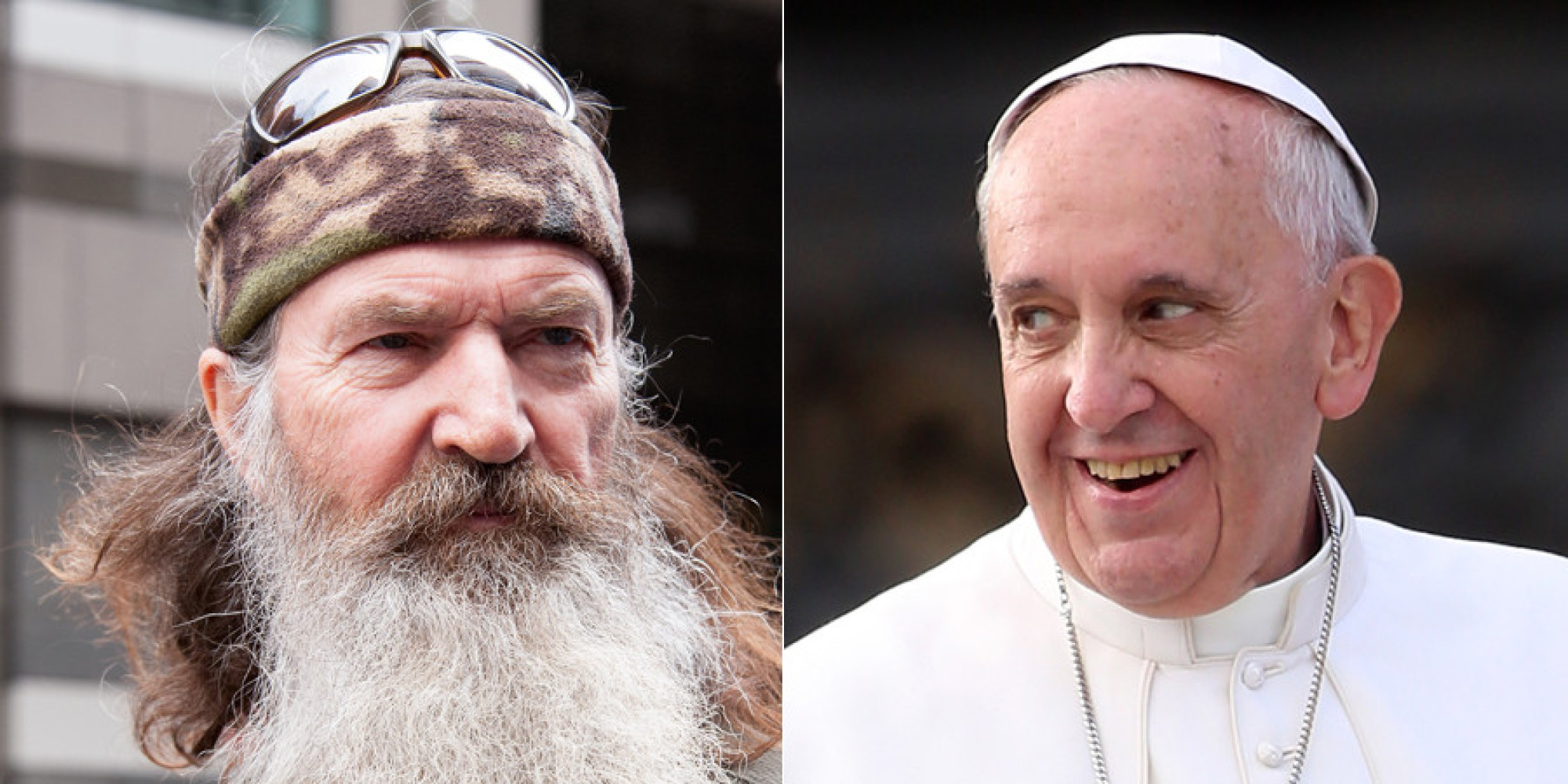"I predict, this 19th day of December of the year 2013, that Mike Brooks will soon compose a blog post on the difference between our 1st amendment rights to the free exercise of speech and our need to be accountable for the consequences that flow from our free exercise of speech, complete with Phil Robertson references ..." - Jeff WeldonIt was early Thursday morning when I read about what, judging by the number of people weighing in via Facebook, must be the most important news story since the World Trade Center was destroyed by terrorists: some old, conservative, Southern, Christian dude believes - correctly - that the Bible condemns homosexuality. This is not an uncommon position (and can even be held by some young, moderate, Yankee, Muslim woman), so I was a little surprised at the outrage. After reading up on what was actually said (oh my.....), I started to wonder if anyone posting their support had actually done the same, or if they simply wanted to state a position in the imaginary "war on free speech".
I should begin with a disclaimer as well as an admission of my own personal bias in this situation. I have never watched a single clip from "Duck Dynasty". I had seen these bearded guys pop up in the Facebook news feed in the past year or two with a similar frequency to Candy Crush invites, but largely ignored them both - just as I scrolled past more than a few statements about Jesus and sisters and moms being the best without a "like" or "share" (Sorry, Mom). It appears the draw for many evangelicals is that it portrays a family outspoken about their faith, without inappropriate language or situations; this of course stands in contrast to the commentary about human anatomy in the interview which I would not want my kids to read.
I also fully admit, right here and now, that I really have a strong dislike for "reality television" in general. I sadly witnessed the birth of this genre when tuning in to MTV one day (the M stood for "music") hoping to see that zany "Once in a Lifetime" video - but instead being rudely introduced to a "Real World". Video may have killed the radio star, but "reality" was killing the video, and I was not a fan. Why can it never just be the same as it ever was?
Fortunately, it would be many years later before the virus would spread to claim much of television. For much of my youth, I could still watch scripted sitcoms like Family Ties or The Cosby Show on the main networks, thank God. To this day, seeing another commercial for the 56th reincarnation of The Bachelor or America's Got Cooties or for the newest group of B-list celebrities dancing or diving or writing haiku drives me to my knees, begging the Almighty for even an ALF rerun. So, even if the Robertsons are better role models than the Kardashians, I would still tend to root for the cancellation of "Duck Dynasty", simply on principle.
And now, to fulfill the prophecy.
"Congress shall make no law respecting an establishment of religion, or prohibiting the free exercise thereof; or abridging the freedom of speech, or of the press; or the right of the people peaceably to assemble, and to petition the Government for a redress of grievances..." - First AmendmentThe first amendment is often referenced by its individual protections by phrases like "freedom of religion" or "freedom of speech". The purpose of the Bill of Rights, if not the entire US Constitution, is to restrain the power of government to ensure a measure of personal liberty, and it is no coincidence that religion and speech are mentioned first in the amendment that is the first of the American Magna Carta. To the best of my knowledge, however, Congress has made no law as a result of Phil Robertson's recent comments, so any reference to the first amendment in his defense is misplaced. People may debate whether the television network reacted appropriately or inappropriately to the comments, but it is not a constitutional matter.
Perhaps the greatest irony in this (or any) discussion of "free speech" is that often, the phrase is used in an attempt to silence or dismiss the speech of someone with an opposing viewpoint. I fully support Mr. Robertson's right to answer a question in any fashion he sees fit, and to hold any religious belief (or none), but I do not see those voicing opposition to his comments as enemies of free speech - they are merely exercising it for themselves. I've seen a lot of threats back and forth over the last couple of days, starting with GLAAD and the NAACP (the last organization in the country allowed by society to use the word "colored", but I digress) threatening the network, but expanding to people threatening advertisers (if they support the show, or if they drop the show), the network threatening Mr. Robertson, and fans of the show threatening the network. It's Chick-Fil-A on steroids. It's messy, and much of it regrettable, but it's all "free speech".
It's also all economics. Yes, Mr. Robertson used some unnecessary, harsh, and completely illogical comments about homosexuality. I certainly can't support his comments personally, but even if he had been respectful and to the point - if he had simply said, "As a Christian I consider homosexuality to be sinful" and left off the bits about vaginas, anuses, and terrorists - I am pretty sure that A&E would have still released the usual disclaimer that the views of Mr. Robertson are his own and do not reflect the ideals of the network. But Mr. Robertson pushed a little harder than that, and then GLAAD pushed back on A&E, and they in turn completed the triangle by pushing back on him. Mr. Robertson's comments very likely come from his own personal convictions, but the network's reaction is more likely out of economic consideration. The stronger the wording, the more likely there may be an economic cost to someone involved, whether the loss of a contact, contract, or position. Often the real enemy of free speech isn't another's free speech, it's capitalism.
I can't help but think how little I heard the phrase "freedom of speech" ten years ago, when in March of 2003, lead singer Natalie Maines of the Dixie Chicks told an audience in London: "Just so you know, we're on the good side with y'all. We do not want this war, this violence, and we're ashamed that the President of the United States is from Texas." The backlash was strong and swift; radio stations dropped the Chicks from rotation (their cover of Landslide dropped from #10 to #43 in a single week), and groups organized public destruction of their CDs. A lot of the same people who are today suggesting that actions taken against Mr. Robertson are un-American and/or violations of the freedom of speech were also highly supportive of such retribution against the country trio.
As the saying goes, freedom isn't free. There are costs to taking a stand for anything, which is why many politicians (and sadly, many religious leaders) don't really say anything that means anything. One should speak his or her mind with conviction, based on the power we have through our liberty. But, as Spidey will tell you, with (great) power comes (great) responsibility. Simply having the right to say what you wish does not imply that either the content of your message or the manner in which it is delivered is right. Part of communication is at least giving some thought to how the message will be heard by one's intended audience. This isn't "political correctness", it is prudent forethought.
For those who may equate the backlash against Mr. Robertson to an attack on religious belief, consider for a moment that 45% of Americans believe homosexuality to be a sin, and I have never heard anyone suggest that almost half of the population are bigots. Pope Francis has affirmed the teachings of the Catholic church on the matter, and the "liberal media" has named him Person of the Year. If the media is simply opposed to the idea that homosexuality is a sin, or opposed in general to the gospel of Christ, then how could this be? It's very easy to dismiss offense with religion, to suggest that the problem is that someone merely doesn't want to acknowledge "truth" as defined by someone else, but is the goal of religious conversation to offend, or to mend? Most often, the conflict is not one with God - it is with the self-appointed messenger.
I have no doubt that Phil Robertson did not intend offense at his comment. I'm sure he did not mean to present Christianity in a negative (and strange) way. I take him at his word when he says that he does not hate anyone and wants to see people accept his faith, but if this is the goal, perhaps the methods of the Pope are more effective? Mr. Robertson is on a show with a huge viewership, and I don't know what he does on it, but I also see Pope Francis in the headlines about every week: he's feeding people, ministering to the homeless, washing the feet of young prisoners, embracing the physically deformed. Granted, no one expected a GQ article to change the world, but it is very odd that most Christians I know have little to say about the Pope (except for a few who criticize his comments about economics) and yet so many have posted a zealous defense of Mr. Robertson.
Yes, it is true that you can't make an omelet without breaking a few eggs, but going in to the grocery store, picking up a dozen eggs, and dashing them to the ground is not making an omelet, it's just making a mess. What are you cooking today?





